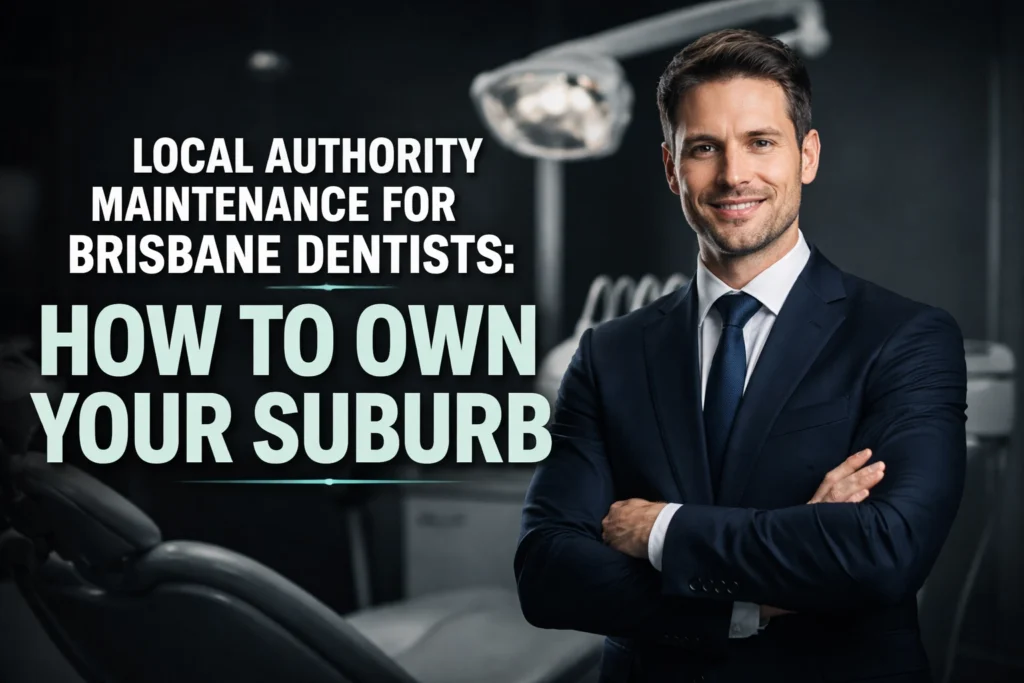- You are here:
- Home »
- Author's Archive:
All posts by Greg Reed

Local Authority Maintenance for Brisbane Painters: Adding Color to Your Digital Strategy
You've got the brushes, the expertise, and the reviews to back up your work. But here's the thing : if your website isn't pulling its weight, potential customers are scrolling right past you and straight into a competitor's inbox.
Brisbane's painting industry is competitive. Really competitive. And while your craftsmanship speaks for itself on walls across Paddington and New Farm, your digital presence needs to work just as hard. That's where local authority maintenance comes in.
Think of it as the regular upkeep your online presence needs to stay fresh, relevant, and : most importantly : visible to the people searching for painters in their suburb right now.
Let's break down exactly how Brisbane painters can brush up their digital strategy and dominate local search results.
Why Local Authority Maintenance Matters for Painters
Here's a stat that might sting: most customers searching for a painter will choose from the first three results on Google. If you're not there, you're invisible.
Local authority maintenance isn't a one-and-done deal. It's the ongoing process of:
- Keeping your website updated with fresh content and recent work
- Building credibility in specific Brisbane suburbs
- Creating helpful content that positions you as the go-to expert
Search engines reward websites that stay active and relevant. A stagnant site? That's a forgettable site. And forgettable doesn't get phone calls.

Monthly Website Tweaks: Small Changes, Big Impact
You don't need a complete website overhaul every month. What you need is consistent, strategic maintenance that signals to Google (and your potential customers) that you're active, professional, and worth hiring.
Keep Your Project Portfolio Fresh
Your portfolio is your digital showroom. If the most recent project listed is from 2022, visitors are going to wonder if you're still in business.
Here's what to do:
- Add new projects monthly : even one or two makes a difference
- Include high-quality before and after shots : these are gold for conversions
- Write brief descriptions for each project (suburb, scope, paint types used)
- Tag projects by service type (interior, exterior, commercial, residential)
Pro tip: Before and after images aren't just visually satisfying : they tell a story. A peeling, sun-damaged Queenslander transformed into a vibrant family home? That's compelling content that sells your skills without saying a word.
Speed Matters: Optimise for Mobile
Over 60% of local searches happen on mobile devices. If your site takes more than three seconds to load, you're losing potential jobs before they even see your work.
Quick wins for mobile optimisation:
- Compress your images : large files slow everything down
- Use a responsive design that adapts to any screen size
- Minimise pop-ups that frustrate mobile users
- Test your site regularly on different devices
A fast, mobile-friendly site doesn't just improve user experience : it's a ranking factor Google takes seriously.

Suburb Profiling: Own Your Local Turf
Here's where Brisbane painters can really separate themselves from the pack. Instead of trying to rank for "painters Brisbane" (a brutally competitive term), focus on becoming the authority in specific suburbs.
Why Suburb-Specific Pages Work
When someone in Bulimba searches for "painters Bulimba," they want a local expert. Someone who knows the area, understands the architecture, and has worked on homes just like theirs.
Creating dedicated suburb pages allows you to:
- Target hyper-local keywords with less competition
- Showcase projects completed in that specific area
- Build trust with residents who want a local professional
- Improve your chances of appearing in Google's local pack
Suburbs to Target for Brisbane Painters
Not all suburbs are created equal. Focus your efforts on areas with strong demand and a mix of residential and commercial properties:
| Suburb | Why It's Worth Targeting |
|---|---|
| Ascot | High-end homes, heritage properties, clients who value quality |
| Bulimba | Family-focused suburb with constant renovations and updates |
| Tarragindi | Established homes needing refreshes, strong community feel |
| Paddington | Character homes, Queenslanders, interior transformations |
| New Farm | Mix of apartments and heritage homes, high turnover |
What to include on suburb pages:
- A brief intro about the suburb and its housing styles
- Photos from completed projects in that area
- Testimonials from local customers (if possible)
- Specific services relevant to that suburb's needs
This isn't about keyword stuffing. It's about demonstrating genuine local expertise that resonates with residents.

Local SEO Articles: Share Your Expertise, Build Trust
Content marketing isn't just for tech companies and lifestyle brands. For Brisbane painters, helpful, locally-relevant articles can be a game-changer for building authority and attracting organic traffic.
The key? Write about what your customers actually want to know.
Topic Ideas That Work for Brisbane Painters
1. Colour Trends and Advice
Homeowners love inspiration. Articles like "Top Exterior Paint Colours for Brisbane Homes in 2026" or "How to Choose the Right White for Queensland Light" position you as a knowledgeable guide, not just a service provider.
2. Dealing with Brisbane's Climate
This is where local expertise really shines. Brisbane's humidity, UV exposure, and storm seasons all impact paint longevity. Write about:
- Best exterior paints for Queensland sun exposure
- How humidity affects drying times and finish quality
- Preparing your home's exterior for storm season
- Signs your exterior paint is failing due to weather damage
This content answers real questions Brisbane homeowners have : and it signals to Google that you're a relevant, local authority.
3. Maintenance Tips
Help your customers extend the life of their paint job with practical advice:
- How to clean painted walls without damaging the finish
- When to touch up vs. when to repaint
- Seasonal maintenance checklist for exterior paint
Pro tip: Articles that solve problems build trust. When readers see you're willing to share knowledge freely, they're more likely to call you when they need professional help.

How Often Should You Publish?
You don't need to become a full-time blogger. One quality article per month is enough to keep your site fresh and give Google new content to index.
Consistency beats volume. A steady stream of helpful, locally-focused content will outperform a burst of articles followed by months of silence.
Putting It All Together: Your Monthly Maintenance Checklist
Here's a simple framework Brisbane painters can follow to maintain and build local authority:
Weekly:
- Monitor Google Business Profile for new reviews (respond to all of them)
- Check website speed and functionality on mobile
Monthly:
- Add at least one new project to your portfolio
- Publish one locally-relevant blog article
- Update any outdated information (pricing, service areas, contact details)
Quarterly:
- Create or refresh a suburb-specific landing page
- Audit your site for broken links and outdated images
- Review analytics to see what's working and what needs attention
This isn't overwhelming. It's just consistent effort that compounds over time. Six months from now, you'll have a website that works as hard as you do.
The Bottom Line
Brisbane painters have an incredible opportunity to stand out online : but only if they're willing to put in the maintenance work. A gorgeous paint job fades without proper care. Your website is no different.
Monthly tweaks keep your site fresh. Suburb profiling makes you the local expert. And helpful content builds the trust that turns browsers into customers.
Your competition is out there right now, updating their portfolios and writing articles about exterior paint in Queensland humidity. The question is: are you going to let them take your spot?

Local Authority Maintenance for Brisbane Pest Control: Dominating Your Local Territory
Here's a question that keeps Brisbane pest control operators up at night: Why does the business down the road keep landing jobs in your territory?
It's not because they're better at spraying for cockroaches. It's because they've figured out something you haven't : local authority maintenance. They're not just running a pest control business; they're building a digital presence that screams "we own this suburb."
The good news? You can do the same thing. And it doesn't require a complete website overhaul or a marketing degree. It requires consistency, local focus, and smart content.
Let's break down exactly how Brisbane pest control services can dominate their local territory through ongoing website maintenance.
Why Local Authority Matters More Than Ever for Pest Control
Brisbane homeowners don't search for "best pest control in Australia." They search for "pest control near me" or "termite inspection Indooroopilly" or "cockroach treatment North Lakes."
Google knows this. That's why local businesses with strong suburb-specific content consistently outrank bigger competitors with generic websites.
Consider these facts:
- 46% of all Google searches have local intent
- 76% of people who search for something nearby visit a business within 24 hours
- Pest control is inherently local : nobody's driving across Brisbane for a spider treatment
The pest control companies winning right now aren't necessarily the biggest. They're the ones showing up consistently in local search results because they've invested in local authority maintenance.

1. Monthly Website Tweaks: Staying Relevant Through Seasonal Pest Surges
Your website isn't a "set and forget" tool. It's a living asset that needs regular attention : especially in an industry as seasonal as pest control.
Align Your Content with Brisbane's Pest Calendar
Brisbane's subtropical climate means pest activity shifts dramatically throughout the year. Your website should reflect this:
| Season | Peak Pests | Content Focus |
|---|---|---|
| Summer (Dec-Feb) | Cockroaches, ants, mosquitoes | Heat-related infestations, outdoor entertaining prep |
| Autumn (Mar-May) | Rodents, spiders | Pests seeking shelter as temps drop |
| Winter (Jun-Aug) | Termites, possums | Termite swarming season, roof inspections |
| Spring (Sep-Nov) | Wasps, bees, snakes | Nesting activity, spring cleaning pest checks |
Pro tip: Update your homepage banner and service highlights monthly to match what Brisbane residents are actually dealing with. If it's termite season, your homepage should shout about termite inspections : not generic pest control.
Keep Contact Forms Seamless
Nothing kills a conversion faster than a broken contact form. Every month, you should:
- Test all forms on desktop and mobile
- Check response times : are enquiries going to the right inbox?
- Review your call-to-action buttons : are they visible and compelling?
- Update phone numbers and service areas if anything has changed
A homeowner panicking about a cockroach infestation won't wait around for a form that doesn't work. They'll hit the back button and call your competitor.
Refresh Testimonials and Case Studies
Got a glowing review from a customer in Paddington? Add it to your site. Completed a major termite treatment in Carindale? Write a quick case study.
Fresh, local testimonials build trust and signal to Google that your business is active and relevant.

2. Suburb Profiling: Become THE Pest Expert in Specific Brisbane Areas
Here's where the magic happens. Instead of trying to rank for "pest control Brisbane" (a brutally competitive keyword), you target specific suburbs where you can realistically dominate.
Pick Your Priority Suburbs
Start with 5-10 suburbs where you:
- Already have customers
- Want to grow your presence
- Can realistically service quickly
For example:
- North Lakes : fast-growing family suburb with new builds (termite central)
- Indooroopilly : established homes with older timber frames
- Carindale : mix of residential and commercial properties
- Chermside : high-density living with cockroach and rodent challenges
- Wynnum : coastal suburb with unique moisture-related pest issues
Create Dedicated Suburb Pages
Each priority suburb deserves its own page on your website. Not a generic page with the suburb name swapped in : a genuinely useful, locally-specific page.
Include:
- Common pest issues in that specific suburb
- Local landmarks or context (shows you actually know the area)
- Testimonials from customers in that suburb
- Service response times for that location
- Contact details and a clear CTA
A page titled "Pest Control North Lakes: Fast Response for Termites, Cockroaches & Rodents" will outperform a generic services page every single time.
Use Local Schema Markup
This is slightly technical, but worth mentioning. Schema markup helps Google understand your business location and service areas. Make sure your suburb pages include:
- Local business schema
- Service area schema
- Review schema (if you have suburb-specific reviews)
Your web developer can implement this, or you can use plugins if you're on WordPress.

3. Local SEO Articles: Building Trust Through Expert Content
Content marketing for pest control isn't about churning out generic blog posts. It's about positioning yourself as the local expert that Brisbane residents trust.
Share Practical Pest Prevention Advice
Homeowners love content that helps them avoid problems. Consider articles like:
- "5 Signs You Have Termites in Your Brisbane Home (And What to Do Next)"
- "Why Brisbane's Wet Season Brings More Cockroaches Inside"
- "How to Pest-Proof Your Home Before Summer BBQ Season"
These articles answer real questions Brisbane residents are Googling. They build trust, demonstrate expertise, and keep visitors on your site longer (which Google loves).
Publish Local Termite Warnings and Pest Alerts
When there's a termite swarm in a specific suburb or a spike in rodent activity after flooding, be the first to publish about it.
This type of timely, locally-relevant content:
- Positions you as the go-to local authority
- Earns backlinks from local news sites and community pages
- Drives urgent traffic from worried homeowners
Example headline: "Termite Activity Surging in North Lakes After Recent Rains : What Homeowners Need to Know"
Target Long-Tail Local Keywords
Instead of fighting for "pest control Brisbane," target longer, more specific phrases:
- "How much does termite treatment cost in Brisbane?"
- "Best way to get rid of ants in Indooroopilly"
- "Emergency pest control Chermside"
These keywords have lower search volume but much higher intent. Someone searching "emergency pest control Chermside" needs help right now : and they'll call the first business that shows up.

Putting It All Together: Your Local Authority Maintenance Plan
Local authority doesn't happen overnight. It's built through consistent, focused effort over months and years.
Here's a simple monthly maintenance plan for Brisbane pest control businesses:
Weekly:
- Check contact forms and booking systems
- Respond to and request Google reviews
Monthly:
- Update homepage content to reflect seasonal pest activity
- Add 1-2 new testimonials or case studies
- Publish 1-2 locally-focused blog articles
Quarterly:
- Audit and update suburb-specific pages
- Review local keyword rankings and adjust strategy
- Refresh outdated content with current information
Annually:
- Complete website audit for technical issues
- Update all service descriptions and pricing
- Plan content calendar around Brisbane's pest seasons
The pest control businesses that commit to this process will steadily climb local rankings while competitors wonder what happened.
Ready to Own Your Local Territory?
Your website might be functional. It might even look decent. But if it's not actively working to build your local authority, it's not working hard enough.
Brisbane homeowners have endless options when pests strike. The question is: will they find you : or your competitor?
Local authority maintenance transforms your website from a digital brochure into a lead-generating, trust-building machine that dominates your service areas.

Local Authority Maintenance for Brisbane Builders: Constructing a Dominant Online Presence
Here's the thing about building a successful construction business in Brisbane: your craftsmanship might be impeccable, but if your online presence is collecting dust, you're handing jobs to competitors who showed up first on Google.
The Brisbane building market is competitive. Homeowners researching renovations, knockdown rebuilds, or new constructions aren't flipping through Yellow Pages anymore. They're scrolling through Google, checking out project galleries, and reading reviews before they even pick up the phone.
That's where Local Authority Maintenance comes in. It's not a one-time website overhaul: it's an ongoing strategy that keeps your digital presence as solid as the foundations you pour. Let's break down exactly how Brisbane builders can construct a dominant online presence that converts browsers into clients.
Why Your Website Needs Ongoing Attention (Not Just a One-Time Build)
Think of your website like a display home. You wouldn't leave a display home untouched for two years and expect it to impress buyers, right? The landscaping gets overgrown, the paint fades, and suddenly it looks neglected compared to the shiny new one down the street.
Your website works the same way. A site that was cutting-edge in 2022 now feels dated. Slow load times frustrate visitors. Outdated project galleries suggest you haven't been busy. And Google notices all of it.
Regular maintenance ensures:
- Your site loads fast on mobile devices (where most of your potential clients are searching)
- Security updates protect against threats that could take your site offline
- Fresh content signals to Google that you're an active, relevant business
- Your portfolio showcases your latest and greatest work
The builders who dominate Brisbane's search results aren't necessarily the biggest operators: they're the ones who consistently maintain and update their online presence.

Monthly Website Tweaks: Showcasing Your Craftsmanship
Your project gallery is your most powerful sales tool. It's visual proof of what you can deliver. But here's what separates good builders from forgettable ones online: consistency in updating that portfolio.
What Monthly Tweaks Look Like for Builders
Project Gallery Updates:
- Add photos from recently completed builds (aim for at least one new project monthly)
- Include before-and-after shots that tell a transformation story
- Feature different project types to show your range: renovations, new builds, extensions, commercial work
Site Performance Checks:
- Test load speeds across mobile and desktop
- Compress new images so they don't slow things down
- Fix any broken links or outdated information
- Update contact details if anything changes
Testimonial Refreshes:
- Request reviews from recently completed projects
- Add fresh Google reviews to your testimonials page
- Feature client quotes alongside relevant project images
Pro tip: Set a recurring calendar reminder for the first Monday of each month. Spend 30 minutes updating your site with recent project photos and any new reviews. This small habit compounds into serious online authority over time.
The Technical Side Matters Too
Beyond the visual updates, your site needs regular technical maintenance:
- WordPress and plugin updates to prevent security vulnerabilities
- Backup checks to ensure you can recover if something goes wrong
- Speed optimisation because a one-second delay in load time can reduce conversions by 7%
- Mobile responsiveness testing since over 60% of searches happen on phones
You don't need to become a web developer: but you do need these things happening consistently, whether you do it yourself or partner with someone who handles it for you.
Suburb Profiling: Dominating High-Growth Brisbane Areas
Here's where Brisbane builders can really separate themselves from the pack. Instead of trying to rank for generic terms like "Brisbane builders," smart operators target specific suburbs where they want to win work.

Why Suburb-Specific Content Works
When a homeowner in Paddington searches for "home renovations Paddington" or "builders near New Farm," they're showing serious intent. They're not casually browsing: they're looking for someone local who understands their area.
By creating dedicated content for target suburbs, you:
- Rank for lower-competition, higher-intent keywords
- Demonstrate local expertise and familiarity
- Build trust with potential clients who see you understand their neighbourhood
High-Growth Brisbane Suburbs to Target
Consider creating dedicated pages or content for suburbs like:
| Suburb | Why Target It |
|---|---|
| Paddington | Character home renovations, heritage overlays, high property values |
| New Farm | Inner-city renovations, townhouse builds, affluent clientele |
| Upper Kedron | New land releases, family home constructions, growing population |
| Bulimba | Flood-affected rebuilds, luxury renovations, waterfront properties |
| Ascot | High-end custom builds, prestigious address, discerning clients |
| Woolloongabba | Post-Olympics development boom, unit conversions, investment builds |
What Suburb Profile Pages Should Include
Each suburb page should feature:
- Local building insights (soil types, council requirements, common renovation needs)
- Completed projects in that area with photos and descriptions
- Suburb-specific challenges you've solved (e.g., flood compliance in Bulimba, heritage restrictions in Paddington)
- Clear calls to action for homeowners in that area
Pro tip: Don't just create these pages and forget them. Update them quarterly with new projects from that suburb and any changes to local council requirements.
Local SEO Articles: Positioning Yourself as Brisbane's Building Expert
Beyond your service pages and portfolio, educational content positions you as the go-to authority in Brisbane's building scene. When homeowners are researching before they're ready to buy, you want them finding your advice.

Content Topics That Attract Brisbane Homeowners
Think about the questions your clients ask during initial consultations. Those questions are being typed into Google every single day. Here are content ideas that work:
Renovation-Focused:
- "What to Know Before Renovating a Queenslander in Brisbane"
- "How Much Does a Home Extension Cost in Brisbane? (2026 Guide)"
- "Character Home vs. Knockdown Rebuild: Which Makes Sense in Brisbane?"
Permits and Compliance:
- "Brisbane Council Building Approvals: A Homeowner's Guide"
- "Understanding Flood Overlays for Brisbane Renovations"
- "Heritage Overlay Building in Brisbane: What You Can and Can't Do"
Sustainable Building:
- "Energy-Efficient Building Options for Brisbane's Climate"
- "Solar Passive Design for Queensland Homes"
- "Sustainable Materials for Brisbane Builds: What Works Best"
How Often Should You Publish?
Quality beats quantity, but consistency matters. Aim for:
- One substantial article per month (800-1,200 words)
- Topics that answer real client questions
- Local Brisbane angles on every piece (not generic building content)
Each article should include internal links to your services and project gallery, plus a clear call to action for readers ready to take the next step.

Putting It All Together: Your Local Authority Maintenance Plan
Here's how the three pillars work together to build your dominant online presence:
| Activity | Frequency | Impact |
|---|---|---|
| Project gallery updates | Monthly | Showcases current work, keeps site fresh |
| Site performance checks | Monthly | Maintains speed, security, user experience |
| Suburb profile updates | Quarterly | Targets high-value local searches |
| Educational blog articles | Monthly | Builds authority, attracts research-phase clients |
| Review collection | Ongoing | Builds social proof and trust signals |
The builders who commit to this ongoing maintenance don't just show up in search results: they dominate them. They become the obvious choice for homeowners who've seen their name, read their advice, and reviewed their portfolio multiple times before making contact.
Ready to Build Your Online Authority?
Your website isn't broken. It's forgettable. And in Brisbane's competitive building market, forgettable means invisible.
Local Authority Maintenance transforms your online presence from a static brochure into a client-generating machine. Fresh project galleries, suburb-specific targeting, and expert content that positions you as Brisbane's go-to builder: that's how you construct a dominant digital presence.

Local Authority Maintenance for Brisbane Handyman Services: Nailing Your Local Market
Here's the thing about being a handyman in Brisbane: you're competing with every bloke who owns a ute and a drill. The difference between staying busy year-round and scraping for jobs? Local authority.
Not the council kind (though that's a market worth exploring). We're talking about becoming the go-to name when someone in Chermside needs a deck fixed or a Coorparoo homeowner has a list of odd jobs that's been growing for six months.
Local Authority Maintenance isn't a one-time setup. It's an ongoing strategy that keeps your website visible, your reputation solid, and your phone ringing. Let's break down exactly how Brisbane handyman services can nail their local market.
Why Local Authority Matters for Handyman Services
Think about how people search for a handyman. It's rarely planned weeks in advance. Someone notices a wobbly handrail, a leaky tap, or a door that won't close properly: and they want it sorted now.
When that happens, they're grabbing their phone and typing something like:
- "Handyman near me"
- "Odd jobs Chermside"
- "Home repairs Coorparoo"
If your business doesn't show up in those searches, you don't exist. Simple as that.
Local Authority Maintenance ensures you're not just visible: you're the obvious choice. It's about:
- Keeping your website in top shape
- Owning specific suburbs in search results
- Building trust before someone even picks up the phone
Let's get into the details.
Monthly Website Tweaks: Speed and Mobile-First Wins the Job
Your website is your digital shopfront. And for handyman services, it needs to work as hard as you do.

Why Monthly Maintenance Matters
Google doesn't just rank websites and forget about them. Search algorithms are constantly evaluating:
- Page speed – How fast does your site load?
- Mobile responsiveness – Does it work properly on a phone?
- Fresh content – Is your site active or collecting dust?
- Technical health – Are there broken links, errors, or security issues?
A website that was perfect six months ago might be slipping in rankings today. Monthly tweaks keep you competitive.
Key Monthly Tasks for Handyman Websites
Here's what should be on your maintenance checklist:
| Task | Why It Matters |
|---|---|
| Speed optimisation | 53% of mobile users abandon sites that take over 3 seconds to load |
| Mobile testing | Most local searches happen on phones: your site must work flawlessly |
| Image compression | Large images slow everything down |
| Plugin/software updates | Outdated software creates security vulnerabilities |
| Contact form testing | A broken form means lost leads |
| Google Business Profile updates | Fresh photos and posts boost local visibility |
Pro tip: Add your most recent completed jobs to your site each month. It shows you're active, builds social proof, and gives Google fresh content to index.
Speed Matters More Than You Think
When someone's standing in their kitchen with water dripping from under the sink, they're not going to wait for a slow website to load. They'll hit the back button and call your competitor instead.
Aim for a load time under 2.5 seconds. Use tools like Google PageSpeed Insights to check where you stand: and fix what's slowing you down.
Suburb Profiling: Becoming the Trusted Handyman in Your Target Areas
Here's where most Brisbane handyman businesses get it wrong: they try to target "Brisbane" as a whole.
That's a massive area. You're competing with hundreds of other services, and your marketing message becomes generic.
Suburb profiling flips the script. Instead of being one of many handymen in Brisbane, you become the handyman in Chermside, Coorparoo, Kedron, or wherever your ideal customers live.

How Suburb Profiling Works
The strategy is straightforward:
- Identify your target suburbs – Where do you want more work? Where are your best customers located?
- Create dedicated content – Build pages or posts specifically about serving those areas
- Use local signals – Mention landmarks, local issues, and suburb-specific details
- Collect local reviews – Ask happy customers to mention their suburb in Google reviews
What to Include in Suburb-Specific Pages
Each suburb page should cover:
- The suburb name in the title and headings (e.g., "Handyman Services in Chermside")
- Common jobs you handle in that area – Older homes in certain suburbs have different needs than new builds
- Local knowledge – Reference nearby shopping centres, schools, or community features
- Service radius – Mention surrounding suburbs you also cover
- A clear call to action – Make it easy to request a quote
Example: Targeting Chermside
Chermside has a mix of established family homes and newer apartments. A suburb-specific page might mention:
- Deck repairs and maintenance for older Queenslanders
- Flat-pack furniture assembly for apartment dwellers
- General maintenance for busy families in the area
- Quick response times because you're locally based
This specificity tells Google: and potential customers: that you actually know and serve this area. You're not just another generic listing.
Pro tip: Create a dedicated page for each of your top 5-10 target suburbs. Update them quarterly with fresh content or recent job examples from that area.
Local SEO Articles: Building Authority Through Helpful Content
Want to know the secret weapon most handyman businesses ignore? Content marketing.
Publishing helpful articles positions you as the expert. It builds trust before someone even contacts you. And it gives Google more reasons to show your website in search results.

What Kind of Articles Should You Write?
Focus on content that answers real questions your potential customers are asking:
- How-to guides – "How to Fix a Squeaky Door Hinge" or "DIY vs. Calling a Handyman: When to Get Help"
- Maintenance checklists – "Your Brisbane Home Maintenance Checklist for Storm Season"
- Local advice – "Preparing Your Queenslander for Summer: Essential Maintenance Tips"
- Common problem explainers – "Why Your Deck is Rotting and What to Do About It"
The Trust-Building Effect
Here's the psychology at play: when someone reads your helpful article, they start seeing you as the expert. Even if they could do the job themselves, they're more likely to call you because:
- You've already demonstrated knowledge
- They trust your advice
- Your name is now familiar
And if they can't do it themselves? You're the obvious choice.
Content Ideas for Brisbane Handyman Services
| Article Topic | Target Search Intent |
|---|---|
| "10 Home Repairs You Shouldn't Ignore" | Homeowners researching common issues |
| "How to Childproof Your Home: A Brisbane Parent's Guide" | Young families searching for solutions |
| "Storm Season Prep: Protecting Your Brisbane Home" | Seasonal, locally relevant content |
| "What Does a Handyman Actually Do?" | People unfamiliar with handyman services |
| "Small Jobs, Big Impact: Quick Fixes That Add Value to Your Home" | Homeowners thinking about improvements |
Pro tip: End each article with a soft call to action. Something like: "Need a hand with this? Give us a call for a free quote." It's helpful, not pushy.
Putting It All Together: Your Local Authority Game Plan
Local Authority Maintenance isn't complicated, but it does require consistency. Here's your action plan:
Monthly:
- Run speed and mobile tests on your website
- Update your Google Business Profile with new photos or posts
- Check for broken links and fix technical issues
- Add recent job photos or testimonials
Quarterly:
- Review and refresh suburb-specific pages
- Publish 2-3 helpful articles targeting local search terms
- Analyse which suburbs are bringing in the most leads
Ongoing:
- Ask every happy customer for a Google review (mention the suburb!)
- Monitor your local search rankings
- Keep an eye on what competitors are doing

The Bottom Line
Brisbane has no shortage of handyman services. But there's always room for the business that shows up consistently: online and in person.
Local Authority Maintenance gives you the edge. It keeps your website fast and functional. It makes you the trusted name in specific suburbs. And it builds the kind of authority that turns searches into phone calls.
Stop being invisible. Start being the handyman Brisbane homeowners actually find: and trust.

Local Authority Maintenance for Brisbane Air Conditioning & HVAC: Keeping Your Local Leads Cool
Let's be honest, when a Brisbane family's air con dies in the middle of a 38-degree February day, they're not scrolling past page one of Google. They're clicking the first HVAC company that looks legit and local.
So here's the question: Is that company you?
If you're running an air conditioning and HVAC business in Brisbane, you already know the competition is fierce. From established players with 20+ years in the game to newer operators undercutting on price, standing out takes more than a good reputation and a wrapped van.
It takes local authority.
That's where Local Authority Maintenance comes in, a strategic, ongoing approach to making sure your website doesn't just exist, but actually dominates your local area. We're talking about consistent tweaks, suburb-level targeting, and content that positions you as Brisbane's go-to HVAC expert.
Let's break it down.
What Is Local Authority Maintenance?
Think of Local Authority Maintenance as your website's personal trainer. It's not a one-time fix, it's an ongoing program designed to keep your online presence in peak condition.
For Brisbane HVAC businesses, this means:
- Monthly website optimisations that respond to search trends and seasonal demand
- Suburb-specific targeting so you show up where your ideal customers are searching
- Expert content creation that builds trust and positions you as the local authority
The goal? When someone in Bulimba needs emergency AC repair or a family in Carindale wants a new ducted system installed, your business appears first, and looks like the obvious choice.

Monthly Website Tweaks: Staying Cool Under Pressure
Your website isn't a "set and forget" asset. Google's algorithm changes constantly, your competitors are always tweaking their sites, and, most importantly, your customers' needs shift with the seasons.
Brisbane's climate means HVAC demand fluctuates dramatically. Summer brings emergency breakdowns and new installations. Winter sees heating enquiries spike. And year-round, Brisbane's infamous humidity means air quality and mould prevention are always on people's minds.
What Monthly Tweaks Actually Look Like
Here's what we focus on each month to keep your site performing:
- Seasonal keyword updates – Adjusting page content and meta descriptions to match what people are actually searching for right now (e.g., "emergency AC repair Brisbane" in January vs. "ducted heating installation Brisbane" in June)
- Speed and mobile optimisation – Google prioritises fast, mobile-friendly sites. We make sure yours stays that way.
- Local business listing audits – Ensuring your Google Business Profile, Yelp, and other directories are accurate and consistent
- Internal linking improvements – Connecting your service pages and blog posts to boost SEO and keep visitors on your site longer
- Conversion rate tweaks – Testing and improving call-to-action buttons, contact forms, and phone number placement
Pro tip: Even small changes, like updating your homepage headline to mention "24/7 emergency service", can significantly boost enquiries during peak season.
Suburb Profiling: Owning Your Local Patch
Here's a truth bomb: "Brisbane HVAC" is too broad to win.
When someone's aircon breaks down in Ashgrove, they're not searching for "air conditioning Brisbane." They're typing "air conditioning repair Ashgrove" or "emergency AC Ashgrove."
That's where suburb profiling comes in.

How Suburb Profiling Works
We create dedicated landing pages and content targeting the specific suburbs where you want to win work. Each page is optimised for local search terms and speaks directly to that community.
For example:
- Bulimba – Targeting the young professionals and families in renovated Queenslanders who need split system installations and regular servicing
- Carindale – Speaking to homeowners in established suburbs looking for ducted system upgrades and energy-efficient solutions
- Paddington – Addressing the unique challenges of older homes with limited roof space for ducted systems
- Chermside – Capturing the commercial and residential mix with content covering both home and small business HVAC needs
Why This Works
When your website has a dedicated page for "Air Conditioning Services in Bulimba," you're telling Google exactly where you operate, and giving local customers a page that speaks directly to them.
The result? You show up higher in local searches, and when visitors land on your site, they immediately see you service their area. That builds trust and increases conversions.
Local SEO Articles: Becoming Brisbane's HVAC Expert
Let's talk content. And no, we don't mean generic blog posts about "5 Signs Your AC Needs Servicing" that every HVAC company has already published.
We're talking about locally-focused, expert content that answers the questions Brisbane homeowners are actually asking.
Content That Builds Local Authority
Here's the type of content that positions you as Brisbane's trusted HVAC expert:
- "How Brisbane's Humidity Affects Your Air Conditioner (And What to Do About It)" – Practical advice that shows you understand local conditions
- "The Best Air Conditioning Systems for Queensland Summers" – Product recommendations tailored to Brisbane's climate
- "Why Annual AC Servicing Matters in Brisbane's Climate" – Educational content that drives service bookings
- "Mould in Your AC? Here's What Brisbane Homeowners Need to Know" – Addressing a common local concern with expert solutions
- "Ducted vs. Split System: Which Is Right for Your Brisbane Home?" – Helping customers make informed decisions

The SEO Benefits
Each piece of content is an opportunity to rank for new keywords and capture traffic from people researching HVAC solutions. Over time, this content compounds: building a library of resources that continually drives organic traffic to your site.
But here's the real magic: when someone reads your helpful, locally-relevant content, they see you as the expert. And when they're ready to book a service or installation, guess who they call?
Why Consistency Beats One-Off Campaigns
Here's where most HVAC businesses go wrong: they invest in a website redesign or a burst of SEO work, see some results, then stop.
That's like servicing your AC once and expecting it to run perfectly for a decade.
Local Authority Maintenance is about consistent, ongoing effort. It's about:
| One-Off Approach | Local Authority Maintenance |
|---|---|
| Website sits static for months | Monthly updates and optimisations |
| Generic content that doesn't rank | Locally-targeted articles that build authority |
| Competitors eventually overtake you | You stay ahead with consistent improvements |
| Leads dry up over time | Sustainable, growing pipeline of local enquiries |
The HVAC businesses winning in Brisbane right now aren't the ones with the fanciest websites. They're the ones showing up consistently: month after month: in local search results, with content that proves they know their stuff.

What This Means for Your Brisbane HVAC Business
If you're serious about growing your air conditioning and HVAC business in Brisbane, you need more than a website that looks good. You need a website that works: one that:
- Ranks for the suburbs you actually service
- Captures seasonal demand with timely, relevant content
- Builds trust through expert, locally-focused advice
- Converts visitors into enquiries with optimised calls-to-action
Local Authority Maintenance delivers all of this, month after month, so you can focus on what you do best: keeping Brisbane cool.
Ready to Dominate Your Local Market?
Your competitors are already investing in their online presence. The question is: are you going to let them own your suburbs?
If your website isn't generating the local leads it should, it's not because it's broken. It's because it's invisible.

Local Authority Maintenance for Brisbane Roofers: Raising the Roof on Your Local SEO
Here's the thing about roofing in Brisbane: when someone's got water dripping through their ceiling at 2am during storm season, they're not scrolling to page two of Google. They're calling whoever shows up first.
And if that's not you? That's money walking straight to your competitor down the road.
Local authority maintenance isn't about a one-off SEO push or a flashy website redesign. It's about consistent, strategic work that keeps your roofing business visible, credible, and top-of-mind for homeowners across Brisbane's suburbs.
Let's break down exactly how to make that happen.
Why Local Authority Matters for Brisbane Roofers
Brisbane's roofing market is competitive. You've got established operators, new players, and franchise outfits all fighting for the same pool of customers. The businesses that win aren't necessarily the biggest, they're the ones that show up consistently in local searches.
Consider this: when a Coorparoo homeowner searches "roof repairs near me" or "emergency roofer Brisbane southside," Google's job is to deliver the most relevant, trustworthy result. Your job is to prove you're that result.
That's where local authority maintenance comes in. It's the ongoing work that tells Google, and your potential customers, that you're:
- Active in the Brisbane market
- Expert in local roofing challenges
- Trusted by the community you serve
Let's get into the three pillars that make this work.

Monthly Website Tweaks: Keeping Your Digital Shopfront Sharp
Your website isn't a set-and-forget brochure. It's a living asset that needs regular attention, both for the humans visiting it and the search engines crawling it.
What Monthly Tweaks Actually Look Like
Visual freshness:
- Update project photos with recent Brisbane jobs
- Rotate hero images to reflect current seasons (storm damage repairs in summer, general maintenance in winter)
- Refresh testimonials with recent customer feedback
Technical health checks:
- Test page load speeds (especially on mobile, most emergency roofing searches happen on phones)
- Fix broken links and outdated information
- Ensure contact forms and click-to-call buttons work flawlessly
Content updates:
- Add new service areas as you expand
- Update pricing guides or service descriptions
- Refresh meta descriptions to improve click-through rates
Local signals:
- Keep your NAP (Name, Address, Phone) consistent across the site
- Update your Google My Business profile with new photos and posts
- Respond to recent reviews (yes, this counts as maintenance)
Why This Matters for Roofers
Search engines reward websites that demonstrate ongoing activity. A site that hasn't been touched in 18 months looks abandoned, and Google treats it accordingly.
More importantly, your potential customers notice too. Outdated testimonials from 2021? Project photos that look like they were taken on a flip phone? That's not instilling confidence in someone about to hand over thousands for a roof replacement.
Pro tip: Set a recurring calendar reminder for the first Monday of each month. Spend 30 minutes reviewing your site. Small, consistent tweaks compound into serious authority over time.

Suburb Profiling: Owning Your Local Patches
Brisbane isn't one market, it's dozens of micro-markets, each with their own characteristics, housing stock, and roofing needs. Smart roofers don't try to rank for "Brisbane roofer." They dominate specific suburbs where they want to work.
How Suburb Profiling Works
Create dedicated pages or content clusters for the suburbs you service. These aren't thin, spammy pages with the suburb name swapped out. They're genuinely useful resources that demonstrate your knowledge of the area.
For example, a page targeting Ascot might include:
- Common roofing styles in the area (Queenslanders, federation homes, modern builds)
- Typical roofing issues for the suburb (older terracotta tiles, heritage considerations)
- Your experience working in Ascot specifically
- Photos from jobs you've completed in the area
For Mount Gravatt, you might focus on:
- The mix of post-war homes and newer developments
- Hail damage patterns from southside storms
- Accessibility considerations for hillside properties
Suburbs Worth Targeting for Brisbane Roofers
Think about where your ideal jobs come from. Consider factors like:
| Factor | Why It Matters |
|---|---|
| Property values | Higher-value homes often mean bigger roofing budgets |
| Housing age | Older suburbs = more replacement and restoration work |
| Storm exposure | Areas prone to weather damage need emergency services |
| Your location | Suburbs near your base reduce travel time and costs |
High-potential Brisbane suburbs to consider:
- Inner city: New Farm, Paddington, Woolloongabba
- Northside: Chermside, Aspley, Albany Creek
- Southside: Mount Gravatt, Carindale, Sunnybank
- Bayside: Wynnum, Manly, Cleveland
- Western corridor: Kenmore, Chapel Hill, Indooroopilly
The Compound Effect
Here's where it gets powerful. When you've got suburb-specific pages, local SEO articles mentioning those areas, and Google My Business posts about jobs in those suburbs, you're creating a web of local relevance that's hard for competitors to replicate.
A homeowner in Paddington searching for "roof restoration Paddington" finds your dedicated page, sees you've done work in their street, reads an article about caring for Queenslander roofs, and checks your reviews from other Paddington customers. That's authority. That's trust. That's a phone call.

Local SEO Articles: Becoming the Brisbane Roofing Expert
Content marketing for roofers isn't about churning out generic blog posts. It's about creating genuinely useful resources that position you as the local expert while capturing search traffic from potential customers.
Types of Articles That Work for Brisbane Roofers
Seasonal and weather-related content:
- "Preparing Your Brisbane Roof for Storm Season: A Complete Checklist"
- "Post-Hail Roof Inspection: What Brisbane Homeowners Need to Know"
- "How Brisbane's Summer Heat Affects Your Roof (And What to Do About It)"
Local problem-solving guides:
- "Why Brisbane Queenslanders Need Special Roofing Care"
- "The Truth About Asbestos Roofing in Older Brisbane Homes"
- "Roof Ventilation for Brisbane's Humid Climate: What Actually Works"
Decision-making resources:
- "Colorbond vs Tile Roofing: Which Is Right for Your Brisbane Home?"
- "How Much Does a Roof Replacement Cost in Brisbane? (2026 Guide)"
- "Questions to Ask Before Hiring a Brisbane Roofer"
Writing for Humans and Search Engines
Your articles need to satisfy two audiences: the homeowner looking for answers and Google's algorithm looking for relevance signals.
For humans:
- Lead with the answer or key information
- Use clear headings and bullet points
- Include practical, actionable advice
- Write like you're explaining to a customer, not a search engine
For search engines:
- Target specific, relevant keywords naturally
- Include location references throughout
- Link to your service pages and suburb profiles
- Keep content fresh with regular updates
Building a Content Calendar
Consistency beats intensity. One solid article per month builds more authority than a burst of five posts followed by six months of silence.
A simple annual calendar might look like:
- January: Summer heat and roof maintenance
- February: Storm preparation (ahead of late summer storms)
- March-April: Post-storm inspection and repairs
- May-June: Pre-winter roof checks
- July-August: Off-season maintenance tips
- September-October: Spring cleaning for gutters and roofs
- November-December: Year-end home maintenance guides

Putting It All Together
Local authority maintenance isn't complicated, but it does require commitment. The roofers who dominate Brisbane's local search results aren't doing anything magical, they're just doing the work consistently.
Monthly website tweaks keep your site fresh, functional, and favoured by search engines.
Suburb profiling carves out defensible territory in the specific areas you want to serve.
Local SEO articles build your reputation as the Brisbane roofing expert while capturing traffic from homeowners with questions.
Do this for six months, and you'll notice the difference. Do it for two years, and you'll own your local market.
Your Website Isn't Broken. It's Forgettable. Fix It Now!
You don't need a complete website overhaul. You need consistent, strategic maintenance that builds your authority week after week, month after month.

Local Authority Maintenance for Brisbane Electricians: Lighting Up Your Local Market
Here's a stat that should spark your attention: 97% of people search online to find local services: and when someone's power goes out at 9pm in Paddington, they're not flipping through the Yellow Pages.
If you're a Brisbane electrician and your online presence isn't pulling its weight, you're losing jobs to competitors who've figured out the local game. The good news? You don't need a massive marketing budget or a degree in digital wizardry. You need Local Authority Maintenance: a consistent, strategic approach to owning your patch of Brisbane.
Let's break down exactly how monthly website tweaks, suburb profiling, and local SEO articles can turn your business into the first name locals think of when the lights go out.
What Is Local Authority Maintenance?
Think of Local Authority Maintenance as ongoing care for your online presence: like the regular safety inspections you do for your clients, but for your website and local search rankings.
It's not a one-and-done website build. It's a monthly commitment to:
- Keeping your website fast, functional, and conversion-ready
- Building suburb-specific content that targets your service areas
- Publishing helpful articles that position you as the local expert
When done right, this approach helps you rank higher on Google, attract more qualified leads, and become the trusted sparky for specific Brisbane suburbs.

Monthly Website Tweaks: Keeping Your Site Switched On
Your website is your digital shopfront. If it's slow, clunky, or looks like it was built in 2010, potential customers will bounce faster than a tripped safety switch.
Here's what monthly website maintenance looks like for Brisbane electricians:
Speed Optimisation
Google rewards fast websites. Your potential customers do too. Every month, you should be:
- Compressing images and media files
- Clearing outdated plugins and scripts
- Checking mobile load times (most emergency searches happen on phones)
Pro tip: Test your site speed using Google's free PageSpeed Insights tool. Aim for a score above 80 on mobile.
Conversion Elements
Getting traffic is one thing. Turning visitors into booked jobs is another. Monthly tweaks should include:
- Clear calls-to-action on every page ("Call Now for a Free Quote")
- Click-to-call buttons that work seamlessly on mobile
- Updated service areas so locals know you cover their suburb
- Fresh testimonials from recent Brisbane jobs
Content Freshness
Google loves websites that are regularly updated. Even small changes signal that your business is active and relevant. Consider:
- Adding recent project photos
- Updating your services list
- Refreshing your homepage copy seasonally
A stale website tells Google: and your customers: that you might not be in business anymore.
Suburb Profiling: Become the Go-To Sparky for Your Patch
Here's where most Brisbane electricians miss a massive opportunity. Instead of trying to rank for "electrician Brisbane" (where you're competing with hundreds of businesses), you can dominate specific suburbs.
This is called suburb profiling, and it's incredibly effective for tradies.

How Suburb Profiling Works
You create dedicated pages or content for each suburb you service. These pages are optimised for local search terms like:
- "Electrician Paddington"
- "Emergency electrician North Lakes"
- "Residential sparky Bulimba"
- "Smoke alarm installation Chermside"
When someone in Paddington searches for an electrician, Google wants to show them the most relevant local result. A page specifically about your services in Paddington gives you a serious edge.
What to Include on Suburb Pages
Each suburb profile should feature:
- Suburb-specific headline (e.g., "Your Trusted Electrician in Paddington")
- Local landmarks or references that show you know the area
- Services tailored to that suburb (older homes in Paddington might need rewiring; newer estates in North Lakes might need smart home setups)
- Testimonials from customers in that suburb
- Travel time or availability for that area
Which Brisbane Suburbs Should You Target?
Start with the suburbs where you already do the most work, then expand strategically. Consider:
| Suburb Type | Examples | Content Angle |
|---|---|---|
| Inner-city heritage | Paddington, New Farm, Woolloongabba | Rewiring, heritage compliance, switchboard upgrades |
| Growth corridors | North Lakes, Springfield, Coomera | New builds, smart home installation, solar |
| Established family areas | Chermside, Mt Gravatt, Carindale | Safety switches, smoke alarms, ceiling fans |
| Commercial hubs | Fortitude Valley, South Brisbane | Commercial fit-outs, emergency lighting, compliance |
Pro tip: Create a priority list of 10-15 suburbs and build out one new suburb page each month. Within a year, you'll have a powerful local presence.
Local SEO Articles: Share Your Expertise, Build Your Authority
Content marketing isn't just for trendy startups. For Brisbane electricians, publishing helpful articles is one of the most effective ways to:
- Rank for more local search terms
- Build trust with potential customers
- Demonstrate your expertise and credentials
Remember, under Queensland's Electrical Safety Act 2002, all electrical work must be completed by licensed professionals. Your content can educate homeowners about why this matters: and position you as the compliant, trustworthy choice.

Article Ideas That Work for Brisbane Electricians
Here are content topics that attract local searches and showcase your expertise:
Safety and Compliance:
- "When Do You Need an Electrical Certificate of Compliance in Brisbane?"
- "Smoke Alarm Legislation in Queensland: What Brisbane Homeowners Need to Know"
- "Why DIY Electrical Work Is Illegal (And Dangerous) in Australia"
Seasonal and Timely:
- "Preparing Your Brisbane Home's Electrical System for Storm Season"
- "Air Conditioning Electrical Requirements for Brisbane Summers"
- "Christmas Light Safety Tips for Brisbane Families"
Suburb-Specific:
- "Common Electrical Issues in Older Paddington Homes"
- "Solar Panel Installation Guide for North Lakes Properties"
- "Switchboard Upgrades: Why Brisbane's Inner-City Homes Need Them"
Educational:
- "How Often Should You Test Your Safety Switch?"
- "Understanding AS/NZS 3000: What It Means for Your Home"
- "Emergency Lighting Requirements for Brisbane Businesses"
How Often Should You Publish?
Consistency beats volume. Aim for 2-4 quality articles per month. Each article should:
- Target a specific local keyword
- Provide genuine value to Brisbane readers
- Include a clear call-to-action (book a quote, call for advice, etc.)
Over time, this content compounds. Articles you publish today will continue attracting leads for years.
Putting It All Together: Your Monthly Maintenance Checklist
Here's a simple framework to keep your local authority growing month after month:
Week 1: Website Health Check
- Test site speed and fix any issues
- Update calls-to-action and contact details
- Add any new testimonials or project photos
Week 2: Suburb Content
- Publish or update one suburb profile page
- Optimise for local keywords and include area-specific details
Week 3-4: Authority Articles
- Publish 1-2 helpful articles targeting local search terms
- Share on social media and Google Business Profile
Ongoing:
- Monitor Google Business Profile reviews and respond promptly
- Track which suburbs and articles are driving the most enquiries
- Adjust strategy based on what's working
The Bottom Line
Brisbane is a competitive market for electricians. The businesses winning the most local jobs aren't necessarily the biggest or the cheapest: they're the ones showing up consistently in local search results with helpful, relevant content.
Local Authority Maintenance isn't complicated. It's just consistent. Monthly website tweaks keep you conversion-ready. Suburb profiling helps you own your local patches. And SEO articles build the trust and authority that turn searchers into customers.
The question is: are you willing to put in the work, or will you keep watching competitors light up your potential customers' phones?

Local Authority Maintenance for Brisbane Plumbers: Dominating Your Service Area
Here's the thing about being a plumber in Brisbane: you're bloody good at what you do. You can clear a blocked drain in Paddington faster than most people can find a plunger. You know your way around backflow valves, TMV testing, and every council compliance requirement thrown your way.
But when someone in Chermside Googles "emergency plumber near me" at 11pm, are they finding you? Or are they finding the guy three suburbs over who's been quietly building his online presence while you've been focused on the tools?
That's where Local Authority Maintenance comes in. It's not about a flashy website redesign or throwing money at ads. It's about consistent, strategic tweaks that keep your digital presence working as hard as you do.
Let's break down exactly how Brisbane plumbers can dominate their service areas: one suburb at a time.
What Is Local Authority Maintenance?
Think of your website like your work van. You wouldn't let it sit for six months without a service, right? Same deal with your online presence.
Local Authority Maintenance is the ongoing process of:
- Keeping your website fresh with regular updates and technical tweaks
- Profiling specific suburbs so you show up where your customers are searching
- Creating local SEO content that positions you as the go-to expert in your area
It's not a one-and-done job. It's maintenance: just like the trade you know so well.

Monthly Website Tweaks: Keeping Your Site Ready for Emergency Searches
Your website needs to perform when it matters most. And for plumbers, that's often at the worst possible time for homeowners: burst pipes at 2am, blocked toilets on a Sunday morning, hot water systems dying in the middle of winter.
Here's what monthly website maintenance looks like for Brisbane plumbers:
Speed and Performance Checks
- Test your page load speed : If your site takes longer than 3 seconds to load, you're losing jobs to competitors
- Check mobile responsiveness : Over 70% of emergency plumbing searches happen on phones
- Review and compress images : Those before-and-after photos of drain cleans are great, but oversized files kill your speed
Content Freshness
Google loves fresh content. It signals that your business is active and relevant.
- Update your service pages with recent job examples
- Add new testimonials from happy customers (especially suburb-specific ones)
- Refresh your "Areas We Service" page with any new suburbs you're covering
Technical Health
- Fix broken links that frustrate visitors and hurt your SEO
- Update your Google Business Profile with current hours, services, and photos
- Ensure your contact forms and click-to-call buttons actually work : you'd be surprised how often they don't
Pro tip: Set a monthly reminder to test your own website like a customer would. Search for your business, click through your pages, and try to book a job. You'll spot issues fast.
Suburb Profiling: Owning Your Brisbane Service Areas
Here's where most plumbers miss a massive opportunity. They have one generic "Areas We Service" page listing 30 suburbs in dot points. That's not going to cut it.
Suburb profiling means creating dedicated, detailed pages for each key area you service. Why? Because when someone in Indooroopilly searches for a plumber, Google wants to show them a plumber who specifically serves Indooroopilly: not just "Brisbane."

How to Build Effective Suburb Pages
Each suburb page should include:
- Suburb-specific headline : "Your Local Indooroopilly Plumber" not "Plumber Brisbane"
- Local knowledge : Mention specific details like older Queenslander homes with legacy plumbing, new developments, or common issues in the area
- Services tailored to that suburb : Highlight what's most relevant (e.g., hot water replacements for older homes, drainage work for flood-prone areas)
- Testimonials from customers in that suburb : Social proof that you've actually worked there
- Local imagery : Photos from jobs in the area or recognisable landmarks
Priority Suburbs for Brisbane Plumbers
Focus your suburb profiling efforts on high-value areas first:
| Suburb | Why It Matters |
|---|---|
| Indooroopilly | Older homes, high-income demographic, frequent hot water and drainage work |
| Chermside | Mix of residential and commercial, strong search volume |
| Paddington | Heritage homes with complex plumbing needs |
| Carindale | Growing residential area with new builds and renovations |
| Aspley | Established suburb with ageing infrastructure |
| Bulimba | Premium market, high lifetime customer value |
Start with 5-6 suburbs and build from there. Quality beats quantity every time.
Local SEO Articles: Becoming the Trusted Expert
You know those questions customers ask you all the time? The ones you answer without even thinking?
- "Why does my hot water run out so fast?"
- "What's causing that rotten egg smell from my taps?"
- "How often should I get my backflow valve tested?"
Those questions are gold for local SEO content.

Why Local SEO Articles Work
When you write helpful content that answers real questions, you:
- Build trust before a customer even calls you
- Rank for long-tail keywords that capture people earlier in their search journey
- Establish authority as the expert plumber in Brisbane
And here's the kicker: these articles keep working for you 24/7. While you're out on jobs, your content is bringing in new leads.
Content Ideas for Brisbane Plumbers
Here are some article topics that resonate with local customers:
Educational Content:
- "Brisbane Water Pressure Problems: Causes and Solutions"
- "When Do You Need a Plumbing Permit in Brisbane?" (Great opportunity to reference Brisbane City Council's requirements and the Plumbing Hotline on 07 3403 9999)
- "Hot Water System Comparison: What Works Best for Brisbane Homes"
Seasonal Content:
- "Preparing Your Plumbing for Brisbane's Storm Season"
- "Winter Hot Water Maintenance Tips for Queensland Homes"
Local Problem-Solving:
- "Common Drainage Issues in Flood-Prone Brisbane Suburbs"
- "Why Older Brisbane Homes Have Unique Plumbing Challenges"
Pro tip: End each article with a clear call to action. Something like "Need help with [problem]? Call us on [number] for a free quote." Don't leave readers hanging.
Putting It All Together: Your Local Authority Game Plan
Here's the reality: your competitors are already doing this. The plumbers dominating Google results in your area aren't necessarily better tradies than you. They've just been more consistent with their online presence.
Your monthly Local Authority Maintenance checklist:
- Review and update website speed and mobile performance
- Add at least one new testimonial or job photo
- Check all contact forms and booking functions
- Update Google Business Profile with new photos or posts
- Publish one local SEO article targeting common customer questions
- Build or improve one suburb profile page
It's not complicated. It's just consistent. And consistency is what separates the plumbers who get found from the ones who get forgotten.
The Bottom Line
You've built your plumbing business on skill, reliability, and hard work. Your online presence should reflect that.
Local Authority Maintenance isn't about gimmicks or overnight success. It's about showing up consistently: tweaking your site, profiling your suburbs, and creating content that proves you're the expert in your patch.
The plumbers who commit to this process don't just get more leads. They get better leads: customers who already trust them before they pick up the phone.

Local Authority Maintenance for Brisbane Dentists: How to Own Your Suburb
Here's a reality check for Brisbane dentists: your biggest competitor isn't the practice across town: it's invisibility.
When someone in Paddington, Chermside, or Carindale searches "dentist near me," they're not browsing page two of Google. They're clicking on the first few results, booking an appointment, and moving on with their day.
The question is: are you showing up?
Local authority maintenance is the ongoing process of keeping your dental practice visible, relevant, and trusted in the eyes of both Google and your local community. It's not a one-time SEO project. It's a monthly commitment to staying front-of-mind in your suburb.
Let's break down exactly how Brisbane dentists can own their local market through strategic website tweaks, suburb profiling, and locally-focused content.
Why "Set and Forget" Websites Don't Work Anymore
You built a website. It looks professional. It has your services listed, your contact details, maybe even some stock photos of smiling patients.
So why isn't it bringing in new bookings?
Because Google rewards websites that evolve. A static website signals to search engines that nothing new is happening at your practice. And if nothing's happening online, why would Google recommend you over a competitor who's actively publishing, updating, and engaging?
Here's what's at stake:
- Search rankings drop when competitors are more active
- User experience suffers when information becomes outdated
- Trust erodes when your last blog post is from 2021
Local authority maintenance fixes this by treating your website as a living, breathing asset: not a digital brochure collecting dust.

Monthly Website Tweaks: Small Changes, Big Impact
Think of your website like your practice itself. You wouldn't let the waiting room get dusty or keep outdated magazines on the table. Your website deserves the same attention.
Monthly website tweaks keep your site fresh, functional, and favoured by search engines. Here's what that looks like in practice:
Technical Health Checks
- Page speed optimisation – Slow sites lose patients before they even see your services
- Mobile responsiveness – Most local searches happen on phones
- Broken link fixes – Nothing screams "outdated" like a 404 error
- Security updates – SSL certificates and plugin updates protect your site and your patients' trust
Content Refreshes
- Update service pages with current pricing, technology, or treatment options
- Revise your team page when staff changes occur
- Add new FAQs based on questions patients actually ask
- Optimise meta descriptions to improve click-through rates from search results
Conversion Improvements
- Test your booking buttons – Are they visible? Do they work on mobile?
- Add trust signals – Patient reviews, industry memberships, before/after galleries
- Streamline contact forms – Every extra field is a potential drop-off
Pro tip: Set a recurring monthly calendar reminder to audit your website. Even 30 minutes of tweaks can make a measurable difference over time.
Suburb Profiling: Capture Local Intent Where It Matters
Here's something most Brisbane dentists miss: generic location targeting doesn't cut it anymore.
Saying you serve "Brisbane" is like saying you serve "Australia." It's technically true but strategically useless.
Google's algorithm has become incredibly sophisticated at understanding local intent. When someone searches "teeth whitening Ashgrove" or "emergency dentist Bulimba," they're looking for a practice that specifically serves that area.
Suburb profiling is how you capture that intent.

What Is Suburb Profiling?
Suburb profiling means creating dedicated content and landing pages for the specific Brisbane suburbs you serve. Instead of one generic "Areas We Serve" page, you build out individual pages that speak directly to each community.
Why It Works for Brisbane Dentists
- Reduces competition – You're not competing against every dentist in Brisbane, just those targeting that specific suburb
- Increases relevance – Google sees your page as the best match for hyper-local searches
- Builds community connection – Patients feel like you understand their neighbourhood
How to Build Effective Suburb Pages
Each suburb page should include:
| Element | Purpose |
|---|---|
| Suburb name in title and headings | Signals local relevance to Google |
| Unique content about the area | Shows genuine local knowledge |
| Nearby landmarks or directions | Helps patients find you easily |
| Local testimonials | Builds trust with that community |
| Embedded Google Map | Reinforces your physical presence |
Example suburbs to target for Brisbane dentists:
- Paddington
- New Farm
- Chermside
- Mount Gravatt
- Carindale
- Indooroopilly
- Wynnum
- Sandgate
Pro tip: Don't just swap suburb names on a template. Write genuinely unique content for each page. Google can spot thin, duplicated content: and so can your patients.
Local SEO Articles: Build Authority One Post at a Time
Your service pages tell people what you do. Your blog posts prove you know what you're talking about.
Local SEO articles are the secret weapon for Brisbane dentists who want to dominate search results. They allow you to target long-tail keywords, answer patient questions, and position your practice as the go-to expert in your area.

What Makes a "Local" SEO Article?
It's not just about writing dental content: it's about writing dental content with a Brisbane angle.
Compare these two approaches:
- ❌ Generic: "5 Benefits of Dental Implants"
- ✅ Local: "Why Brisbane Patients Are Choosing Dental Implants Over Dentures"
The second option signals to Google that your content is specifically relevant to Brisbane searchers. It also resonates more with local readers who see themselves in the content.
Local Article Ideas for Brisbane Dentists
Here are some content angles that combine dental expertise with local relevance:
- "How Brisbane's Water Quality Affects Your Oral Health"
- "Best Foods for Healthy Teeth You Can Find at Brisbane Farmers Markets"
- "Emergency Dental Care in Brisbane: What to Do Outside Business Hours"
- "Preparing Your Kids for Their First Dentist Visit in [Suburb]"
- "Teeth Whitening Before Brisbane Wedding Season: What You Need to Know"
How Often Should You Publish?
Consistency beats volume. For most dental practices, two to four quality articles per month is the sweet spot. This keeps your site active without overwhelming your team or sacrificing quality.
Pro tip: Repurpose your articles into social media posts, email newsletters, and Google Business Profile updates to maximise their reach.
The Compound Effect of Local Authority Maintenance
Here's what happens when you combine monthly website tweaks, suburb profiling, and local SEO articles:
- Month 1-3: Google notices increased activity and starts crawling your site more frequently
- Month 4-6: You begin ranking for suburb-specific and long-tail keywords
- Month 6-12: Your practice becomes the default recommendation for local searches
- Year 2+: Competitors struggle to catch up because you've built sustained authority
This isn't overnight success. It's strategic, compounding growth that puts your practice ahead and keeps you there.

Stop Waiting for Patients to Find You
Most Brisbane dental practices have decent websites. They're functional. They look professional enough.
But decent doesn't get you booked out. Decent doesn't make you the first name that comes to mind when someone chips a tooth in Ashgrove or needs a clean in Cannon Hill.
Local authority maintenance is how you move from decent to dominant. It's the ongoing work of showing up, staying relevant, and proving to Google: and your community: that you're the practice worth choosing.
The practices that commit to this process will own their suburbs. The ones that don't will keep wondering why their competitors always seem busier.

25 Creative Real Estate Lead Generation Ideas You've Never Thought Of
Let's be honest, you're tired of hearing the same lead generation advice. Door knock. Cold call. Post on social media. Rinse. Repeat.
But here's the thing: everyone's doing that. And when everyone zigs, the agents who zag are the ones filling their pipelines with quality leads.
So forget the playbook you've been handed. These 25 creative real estate lead generation ideas are designed to make you memorable, help you stand out, and attract clients who actually want to work with you.
Ready to think different? Let's go.
Community-Based Lead Generation Ideas
1. Host a "First-Time Homebuyer" Workshop at a Local Brewery
Ditch the stuffy conference room. Partner with a trendy local brewery or coffee shop and host casual workshops about the home-buying process. People show up for the vibes, and leave with your contact info.
2. Sponsor a Local Dog Park Cleanup Day
Pet owners are fiercely loyal to people who support their fur babies. Organise a cleanup event, hand out branded poop bag dispensers (yes, really), and watch the conversations flow.
3. Partner with Moving Companies for Referral Swaps
Moving companies interact with people at the exact moment they're buying or selling. Create a mutual referral agreement, you recommend them, they recommend you.
4. Create a "New to the Neighbourhood" Welcome Kit
Partner with local businesses to assemble welcome packages for new residents. Include a coffee shop voucher, a gym trial pass, and your business card. You become the friendly face of the community.

5. Teach a Class at Your Local Community College
Many community colleges offer short courses on real estate basics. Volunteer to teach one. You'll position yourself as the local expert while building relationships with future buyers and sellers.
Quirky Social Media Campaigns
6. Launch a "Hidden Gems" Video Series
Forget generic property tours. Create short-form videos showcasing secret spots in your area, the best taco truck, the park nobody knows about, the coffee shop with the perfect latte. You become the neighbourhood insider.
7. Run a "Guess the Price" Instagram Story Game
Post a listing photo and ask followers to guess the price. The engagement is ridiculous, and you'll quickly identify who's actively paying attention to the market.
8. Start a TikTok Series on Real Estate Myths
"You need 20% down to buy a house." Wrong. Bust common myths in quick, punchy videos. Educational content builds trust, and trust builds leads.
9. Create a "Day in the Life" Behind-the-Scenes Reel
People buy from people. Show the messy car full of lockboxes, the coffee run before an open house, the moment you hand over keys. Authenticity wins.
10. Host an Instagram Live Q&A with a Local Mortgage Broker
Team up with a lender for a joint live session answering buyer questions. You both get exposure to each other's audiences, and viewers get real value.

Tech-Forward Strategies
11. Use AI Chatbots to Qualify Leads While You Sleep
Install an AI-powered chatbot on your website that answers common questions, captures contact info, and books appointments, 24/7. Your website works overtime so you don't have to.
12. Build Neighbourhood-Specific Landing Pages
Stop sending everyone to your generic homepage. Create dedicated landing pages for each suburb you serve, packed with local market data, school info, and community highlights. You'll capture hyper-local search traffic.
13. Offer an In-App Home Valuation Tool
If you have a branded app (or even a website widget), add an instant home valuation feature. Sellers get the info they want, and you get a warm lead.
14. Send AI-Personalised Video Messages
Tools now exist that let you create one video template and automatically insert each prospect's name and relevant property details. It feels personal without the time investment.
15. Use Predictive Analytics to Find Pre-Sellers
AI can now analyse data to predict which homeowners are likely to sell based on life events, equity, and market conditions. Target these people before your competitors even know they exist.
Partnership-Driven Ideas
16. Team Up with Divorce Attorneys
It's not glamorous, but divorce often means a house sale. Build relationships with family law attorneys who can refer clients needing to sell quickly and discreetly.
17. Connect with HR Departments for Relocation Referrals
Large companies relocate employees constantly. Reach out to HR managers and offer yourself as the go-to local agent for incoming staff.

18. Partner with Interior Designers for Staging Collaborations
Offer free consultations with a local interior designer as part of your listing package. The designer gets exposure, you get a value-add that competitors can't match.
19. Collaborate with Financial Planners
Financial planners often advise clients on major life purchases, including homes. Position yourself as their trusted real estate referral.
20. Work with Estate Planning Attorneys
Inherited properties need to be sold. Estate attorneys can connect you with families navigating this process who need a compassionate, knowledgeable agent.
Offline Tactics That Still Work
21. Place QR Codes in Unexpected Spots
Stick QR codes linking to your listings or a free home-buying guide on community boards, gym bulletin boards, and café counters. Add a digital layer to your physical presence.
22. Host Monthly "Coffee & Market Chat" Meetups
Invite locals to a casual monthly coffee where you discuss market trends. No pitch, no pressure, just genuine conversation. Relationships turn into referrals.
23. Sponsor a Little League Team (With a Twist)
Everyone sponsors teams. Go further, show up to games, bring snacks, become part of the community. Parents remember the agent who actually cared.
24. Create a Hyper-Local Print Newsletter
Yes, print. A well-designed quarterly newsletter mailed to a specific neighbourhood stands out precisely because nobody does it anymore. Include market stats, local business spotlights, and a personal note.
25. Host a "Homeowner Maintenance" Workshop
Partner with a local handyman or contractor to teach basic home maintenance skills. Homeowners appreciate the value, and you stay top-of-mind for when they're ready to sell.

Putting It All Together
Here's the truth: none of these ideas work if you try them once and quit. The agents who win at lead generation are the ones who pick a handful of strategies, commit to them, and stay consistent.
Choose three to five ideas from this list that genuinely excite you. Test them for 90 days. Track what works. Double down on winners.
And remember: the best lead generation strategy is the one that feels authentic to you. When you enjoy the process, prospects can tell. And that's when the magic happens.
Your Next Step
You've got the ideas. You've got the motivation. But if your website isn't backing you up: if it sounds like every other agent in town: none of this matters.
